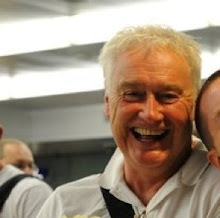
If you’re the kind of sentimental old purist who remembers Mary Martin in the title role, and the words “second star to the right and straight on till morning” still bring a lump to your throat – this is not the Pan for you. This is a modern, popular-culture-on-steroids, musically throbbing show and light years’ flying distance from J M Barrie’s fireside story.
What it lacks in subtlety or adherence to the plot it makes up for with the energy of the ensemble performances led by a Priscilla-derived trio of Motown divas – Nadine Higgin, Donna Hines and Tasheka Coe who carry the singing load (presumably because the principals can’t) with stunning voices and punctuating the action with a series of punchy numbers and sparkly frocks until you’re not sure whether this is panto or promo for Destiny’s Child. They’re called the Pan-ettes, but assessing the carbohydrate load of one or two of them, Paninis might have been funnier.
David Hasselhoff isn’t Ian McKellen. But he isn’t rubbish either, tall enough to invite a sort of totemic admiration merely for being there he turns in a more than adequate performance as a nervously under-confident Hook who ultimately charms rather than frightens the little kiddies, and the knowing references to ‘Knight Rider’ and ‘Baywatch’ are very well-handled. He is not out of his depth.

In contrast, there is no pit of adjectival condemnation deep enough in which to drown Mr Louie Spence, who appears as Roger the Cabin Boy.
I had no previous exposure to the toxic radiation of this character, which I now consider to be the sort of lucky escape you’d have had to be weekending away from Chernobyl in April 1986 - but thanks to Wikipedia I understand he’s a ‘dance expert’ and that overused oxymoron ‘television personality’ whose reputation is fuelled by appearances in tabloid magazines and his own show on Sky 1.
It’s amazing what you can miss if you go out in the evenings.
His wriggling, arse-spreading, tit-flashing, hyperbolically vulgar camp performance is so revolting that it should come with a health warning ‘Not Suitable For Children’. Or Adults. The constant and undisguised references to his sexual appetite and capacity are so far removed from either the clever innuendo tradition of Pantomime where the lewd jokes go over the children’s heads – with Spence’s shockingly nasty aim they’d probably get it in the eye - or from the boundaries of taste and inappropriate stereotyping that you wonder what Wimbledon was thinking of in casting him. Perhaps he’s part of their outreach programme to employ someone with such a disabling speech impediment?

Mr Louie Spence courting tabloid publicity, copyright BigPictures/holymoly.com
On evenings when Mr Hasselhoff is unavailable, the role of Hook will be played by Jerry Springer. Let’s hope he gives Mr Spence the kind of feedback he gives to damaged personalities on his show.
In the rest of the cast, it’s worth praising Shane Knight who looks as if he may be Spence’s understudy but dances better, doubling Nana, a fey Pirate, an Indian and the excellent crocodile. Jaymz Denning leads the Pirate band with considerable charm, and dance captain Katherine Iles is engaging as Tiger Lily. Amy Bird is a rather too bland Wendy and Robert Rees, excellent in State Fair and Hobson’s Choice is not really given full rein in this production, and emerges as a somewhat grounded Peter. Nor are he and Bird allowed to sing until the final number which is a shame because they both have fine musical theatre voices.
There are ten sparkly sets, and the scene changes are slick enough to hold the young audience’s attention but sets, costumes and the Eric Potts script are thoroughly recycled, having done duty last year at Brighton Theatre Royal and previously at Woking and Bromley.
Wimbledon is lucky to have its enterprising theatre which delivers on so many levels, it’s unfortunate this glossy production is damaged by injudicious casting.
This review written for ThePublicReviews





























